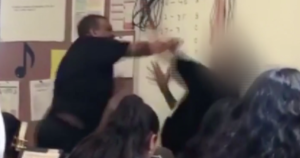Georgia Exact Match Voter ID Law Nullified by Circuit Court
November 14, 2018
Georgia’s exact match voter ID law, which is similar to that of seven other states, was blocked by a federal judge just before the midterm elections November 6. The law states any person’s voter registration would be marked pending should any information be incorrect on their voter registration forms.
Judge Eleanor L. Ross, the district judge for the Northern District of Georgia, ruled the law as an undue burden on voters in Georgia. According to Ross, the law could lead to those whose registrations are marked pending on election day to lose their ability to vote in the elections.
“It’s important for people to vote and have a say in who is the leader of [their] country,” senior Justin Steffeney said.
The exact match voter ID law had caused over 50,000 citizens to have their voter registration forms marked as pending due to anything from an incorrect or outdated address, either on the form or in the database, to a misplaced of dropped hyphe, according to the Associated Press,
“There should be a more rigorous process to removing a voter from registration. This would prevent abuse from elected officials who might attempt to affect the electorate,” senior Henry Gamber said.
This practice, called “voter role maintenance” by Georgia secretary of state and Republican gubernatorial nominee Brian Kemp, has led to the cancellation of more than 1.4 million voter registration forms since 2012 in Georgia.
Freshman Hadley Bowsher said she feels it is important to be able to vote because she feels it is important for your opinions to be represented in the government.
This practice also occurs in Missouri. According to the Missouri secretary of state’s website, voters have three options. Option one is to bring some form of government issued photo ID to the polling place. Option two is to produce some item with address and signature on it, including, but not limited to, utility bills, voter registration card, paycheck, government form or other papers. The final options is to vote using a provincial ballot. This ballot voters sign so the signature can be cross checked for any discrepancy. If there is any, even minor, discrepancy, the vote is voided.
“If you do not possess any of these forms of identification…you may still cast a provisional ballot. Your provisional ballot will be counted if you return to the polling place and show an option one ID or if the signature on the provisional ballot envelope matches the signature on your voter registration record,” the secretary of state’s website reads.



